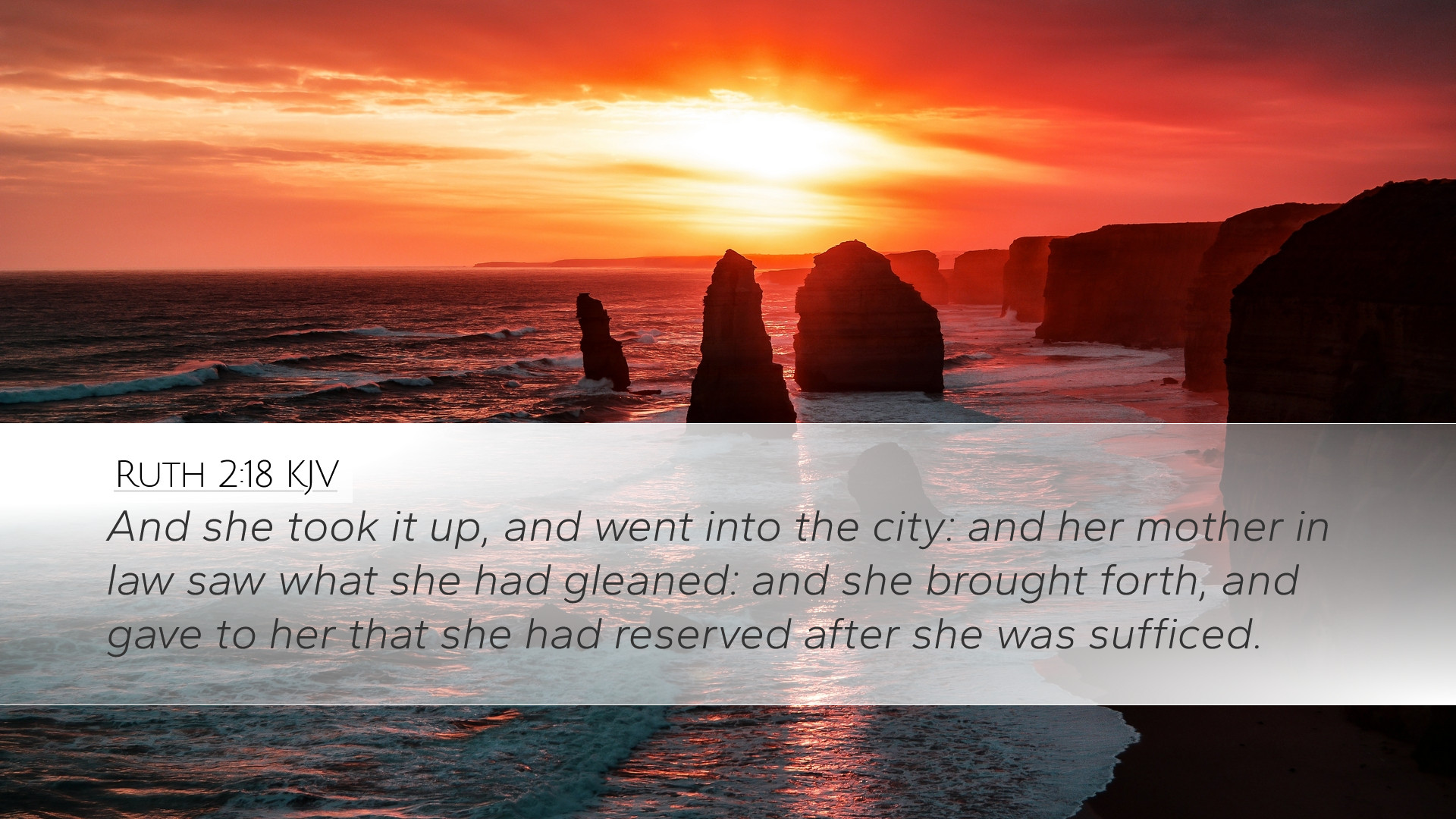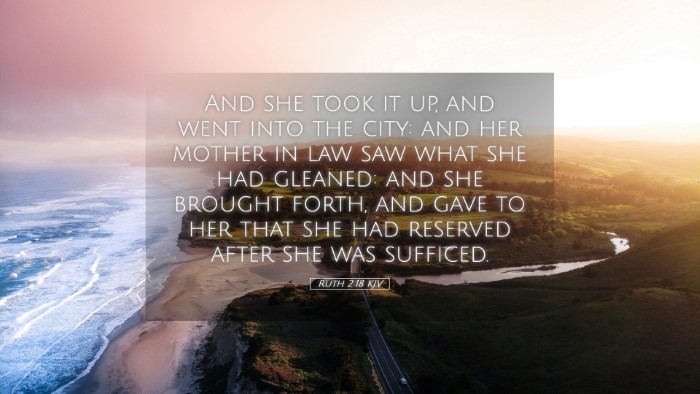Old Testament
Genesis Exodus Leviticus Numbers Deuteronomy Joshua Judges Ruth 1 Samuel 2 Samuel 1 Kings 2 Kings 1 Chronicles 2 Chronicles Ezra Nehemiah Esther Job Psalms Proverbs Ecclesiastes Song of Solomon Isaiah Jeremiah Lamentations Ezekiel Daniel Hosea Joel Amos Obadiah Jonah Micah Nahum Habakkuk Zephaniah Haggai Zechariah MalachiRuth 2:18
Ruth 2:18 KJV
And she took it up, and went into the city: and her mother in law saw what she had gleaned: and she brought forth, and gave to her that she had reserved after she was sufficed.
Ruth 2:18 Bible Commentary
Commentary on Ruth 2:18
The verse Ruth 2:18 states, "And she took it up, and went into the city: and her mother in law saw what she had gleaned: and she brought forth, and gave to her that which she had reserved after she was sufficed." This verse captures a pivotal moment in the narrative of Ruth, where her actions manifest generosity, providence, and the unfolding of God's plan for redemption.
Contextual Background
The Book of Ruth is one of the most beloved narratives in the Old Testament, emphasizing themes of loyalty, kindness, and God's providence in the lives of individuals. Positioned during the time of the judges, the story contrasts the prevailing moral chaos with the faithfulness and righteousness of its fewer characters. Ruth's journey from Moab to Bethlehem illustrates her commitment to Naomi, her mother-in-law, and the God of Israel.
Verse Breakdown
- “And she took it up” - This phrase signifies more than the physical act of gathering grain; it illustrates Ruth's willingness to labor and provide for Naomi and herself. Her determination reflects a spirit of diligence and faith in God's provision.
- “and went into the city” - Ruth’s return to the city symbolizes her reintegration into the community of Bethlehem. This transition also highlights her acceptance of Israel’s customs and her burgeoning faith in Yahweh.
- “and her mother in law saw what she had gleaned” - This moment is crucial as it emphasizes the interaction between Ruth and Naomi. Naomi’s observation underscores the importance of mentorship and mutual support in the relationships depicted within the narrative.
- “and she brought forth” - Ruth’s act of presenting what she had gathered indicates her generosity and love for Naomi. It also signals the fulfillment of their needs through hard work and divine providence.
- “and gave to her that which she had reserved after she was sufficed” - This part illustrates the principle of abundance. Ruth not only provides for immediate needs, but her covenantal love is evident as she shares her surplus, showcasing the biblical values of generosity and community.
Theological Implications
Ruth 2:18 offers profound theological insights that resonate with various aspects of Christian life and doctrine.
- Divine Providence: The gleaning of grain signifies God's providence over His people. As Ruth finds favor in Boaz's field, it is a reminder that God orchestrates circumstances for His purposes, often in the mundane aspects of life.
- Community and Relationships: The bond between Ruth and Naomi illustrates the value of companionship in faith. The shared experiences of loss and provision strengthen their relationship and serve as a model for believers to support one another.
- Covenantal Love: Ruth's actions reflect the concept of hesed (loving-kindness). Her loyalty to Naomi and her commitment to provide for her showcase the selfless love that characterizes the covenant relationship of God's people.
- Foreshadowing Redemption: Ruth's gleaning in the field of Boaz foreshadows the future redemption themes seen in the line of David and ultimately Christ. The story illustrates how God’s redemption plan extends to all, including Gentiles, as Ruth is included in the lineage of Christ.
Insights from Public Domain Commentaries
Matthew Henry's Commentary
Matthew Henry emphasizes the significance of Ruth’s hard work. He notes that her efforts are met with divine favor, which adds to the overarching narrative of God's guidance and sustenance for those who seek Him diligently. Henry remarks on the importance of gratitude, as Ruth shares the fruits of her labor with her mother-in-law, serving as a model of generosity for all believers.
Albert Barnes' Notes on the Bible
Albert Barnes highlights the practicalities of Ruth’s gleaning. He points out that gleaning was a lawful provision for the poor in Israel, reflecting God's care for the destitute. Barnes comments on the significance of Ruth's actions and how they symbolize both physical sustenance and spiritual growth as she integrates into the community of believers.
Adam Clarke's Commentary
Adam Clarke provides an insightful analysis regarding the cultural context of Ruth's actions. He emphasizes how her commitment to Naomi during a time of widespread moral failure is an exemplary model of faith and loyalty. Clarke observes that this aspect of the narrative serves to inspire others in their walk with God, showcasing that individual acts of love play a significant role in God's providential plan.
Application for Today
The lessons derived from Ruth 2:18 carry contemporary significance for pastoral ministry, theological studies, and personal faith journeys.
- Encouragement in Gleaning: Like Ruth, believers are called to glean in their daily lives, seeking God’s providence in their labor—whether in professional endeavors, ministry work, or serving others.
- Fostering Relationships: The relationship between Ruth and Naomi serves as an encouragement to foster strong, supportive relationships within the church. Mentorship, love, and reciprocity enrich the faith community.
- Generosity: Ruth's sharing of what she had represents a challenge to Christians today to practice generosity, ensuring that they meet the needs of others around them while recognizing that all provision comes from God.
- Faith in Adversity: Ruth's journey from Moab to Bethlehem serves as a powerful testimony of faith amid hardship. It encourages believers to trust God’s plans even when circumstances seem discouraging.
Conclusion
Ruth 2:18 encapsulates profound spiritual truths and practical applications that should resonate with pastors, theologians, and the wider faith community. The actions of Ruth exemplify hard work, generosity, and faithfulness, showcasing how God’s providential care manifests through our everyday lives. Through her story, we are reminded of the importance of community, the richness of covenantal love, and the promise of redemption that flows from God’s gracious plans.


